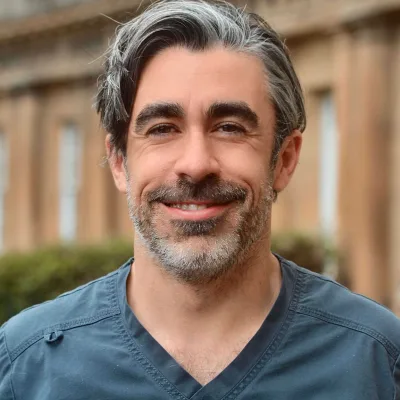We are extremely pleased to welcome Richard Condon, the latest addition to the team here at Circus Dental! Richard brings a wealth of experience to the practice and will be helping us to expand our Endodontic treatments.
Who are you and what do you do?
As of February 4th I will be joining Circus Dental, becoming the latest addition to the endodontic team. I am a GDC registered specialist in Endodontics (root canal treatments) and will be working alongside Jon and Luca (as well as the rest of the team in the practice) in caring for the in-house and referred patients requiring endodontic treatment.
Tell us about your background in dentistry
Born in London, I spent my teens and twenties in Ireland, during which I completed a degree in Business and Law at University College Dublin, before ending up studying Dentistry at Trinity College Dublin. Completing my training in the wake of the death of the ‘Celtic Tiger’, job opportunities were scarce and so I moved back to the UK to practice, settling for the most part in Surrey.
Having always been quite detail-focused, specialisation was a pathway that seemed inevitable to me, and after a couple of years spent in general practice, I applied to, and was accepted into, King’s College London to undertake my Endodontic specialist training.
During the 4-years of part-time training and the time since completing my training, I have worked in a number of endodontic positions. I will be working at Circus Dental 2 days per week, while I also continue working in 2 other practices further east.
What is Endodontics and what role does it play within Circus Dental?
Endodontics is the discipline within dentistry that focuses on the treatment of disease within a tooth; the aim being to eliminate pain and infection, without resorting to tooth extraction. As such, Endodontics is a key cornerstone in any patient’s dental care, ensuring that teeth are ‘healthy’ before any more extensive dental treatment is performed, whether this be repairing a single broken-down tooth or giving someone the full-mouth makeover they have always wanted. In order to give patients the long term outcomes they expect, it is essential to deliver care in a step-by-step manner, with the elimination of ‘disease’ being the first step in any well-considered plan.
Within Circus Dental, Endodontics forms an important role for the care of our in-house patients and also for those patients being referred to us, by their referring dentist, for the treatment of a singular problem.
What type of patients are likely to come to see you?
The range of patients that one sees as an endodontist is quite varied. The majority of one’s work typically comprises adult patients – some who are nervous, some who are not, some who have had root canal treatments before and some who have not. Often a significant portion of these cases will be for ‘retreatments’ – ie where the tooth has previously had a root canal treatment complete but it has not succeeded. Such cases often benefit from the added experience that an endodontist can offer, along with the additional equipment one will have available.
While this may form the bulk of most endodontist’s days, an endodontist will also regularly see patients who have unfortunately suffered dental trauma (for example sporting injuries, bike accidents, simple falls etc), many of whom will be children or young adults. The aim in such instances is to act to limit the damage done and prevent further damage occurring.
Endodontists will also regularly see patients experiencing dental or facial pain that has proved difficult to diagnose. The experience of endodontists in such diagnosis can help determine an appropriate treatment plan to alleviate these symptoms or simply eliminate dental pain as a possible diagnosis, thus allowing an appropriate onward referral, for example to a maxillofacial consultant.
Sometimes, patients will be asked to attend an endodontist simply for an opinion before their dentist proceeds with other treatment, for example orthodontics or placement of a new crown, or to help decide whether a tooth can be saved or if it should be replaced, most often with an implant.
What advice would you give to patients who are feeling stressed or worried about this type of treatment?
While we all appreciate very few people actually enjoy attending the dentist, let alone for a root canal treatment, I can assure you that our number one priority (I believe I can safely speak for Jon and Luca here as well as myself) is to ensure your comfort throughout, part of that being the delivery of entirely pain-free treatment in a very relaxed environment.
This is also part of the reason why a consultation appointment is often important as it allows you to meet Jon, Luca or myself, our assistants and also familiarise yourself with the environment, all of which helps you to feel more relaxed when you return for treatment.
Many patients are pleasantly surprised by the end of their treatment appointment. While some are simply happy that it’s all done and dusted, others are disappointed that the appointment is over as it has served as a peaceful break (particularly from home schooling in recent months), and some are surprised it's already finished, not realising that they had successfully slept through ¾ of the treatment.
I would encourage all patients who are worried to come for your consultation, meet us, ask your questions, discuss your concerns and (it goes without saying) avoid reading what Google has to say about root canal treatments. We will do all we can to accommodate you and put you at ease.
It is one of the most satisfying aspects of being an endodontist, seeing people overcome their anxieties about treatment, and walk away afterwards feeling more confident about any future dental treatment they may need to have done.
Why did you choose to work at Circus Dental?
Was there anything about the practice or its approach that interested you?
Firstly, years ago, as I drove back from Ireland after finishing my training, I did a roaming tour of Southern England. One stop was Bath, and a habit I think is peculiar to all dentists, I noticed brass plaques on the door of a building in the Circus and wandered over to this lovely Georgian building to see who the dentists were who worked there. Ever since this, I always thought, ‘what a fantastic place to work’. Fast forward nearly a decade, the opportunity arises to work in this same building, alongside a group of excellent clinicians, it was a rare opportunity that I knew I could not turn down.
Clearly, I was a fan of the architecture, but the particular excitement for me is the opportunity to work alongside such high calibre clinicians. Circus Dental epitomises, in my opinion, how dental care should be delivered, with a multi-disciplinary approach (i.e., where necessary, dentists of different skill sets work together to deliver the best possible overall results) that is entirely patient-focused.
Working with talented colleagues of the same and other disciplines ensures that patients receive the best possible care, while also creating an environment of continuous professional development and learning.
Is there any specific equipment that you use in your role?
I think it is fair to say that endodontists love equipment (toys/gadgets) and we have plenty of them, some more ‘tech’ than others.
For me, above anything else, the operating microscope is essential, the magnification and lighting that it delivers is unmatched and irreplaceable.
A relatively recent advancement in endodontics is ‘Cone Beam Computed Tomography’. This is a dental CT scan. As an endodontist, I will often take a small size scan (this limits the radiation dose a patient is exposed to) to assist me in reaching a diagnosis and formulating a treatment plan. While endodontics is entirely possible without such scans, the benefits of having and using them are great; allowing for more conservative treatment (i.e. the tooth is left as strong as possible), greater precision, more efficient and effective treatment and much greater certainty. All of which benefit both the patient and myself as the operator.
A rather simple and low-tech one, but still one that patients are often unfamiliar with, is the rubber dam. The benefits of this are huge and it still amazes me how often they are not used for root canal procedures. Put simply, this sheet forms an ‘umbrella’ over the tooth in question, creating a surgical field that improves patient safety, patient comfort and enhances root canal treatment success. Its use is essential and a non-debatable.

